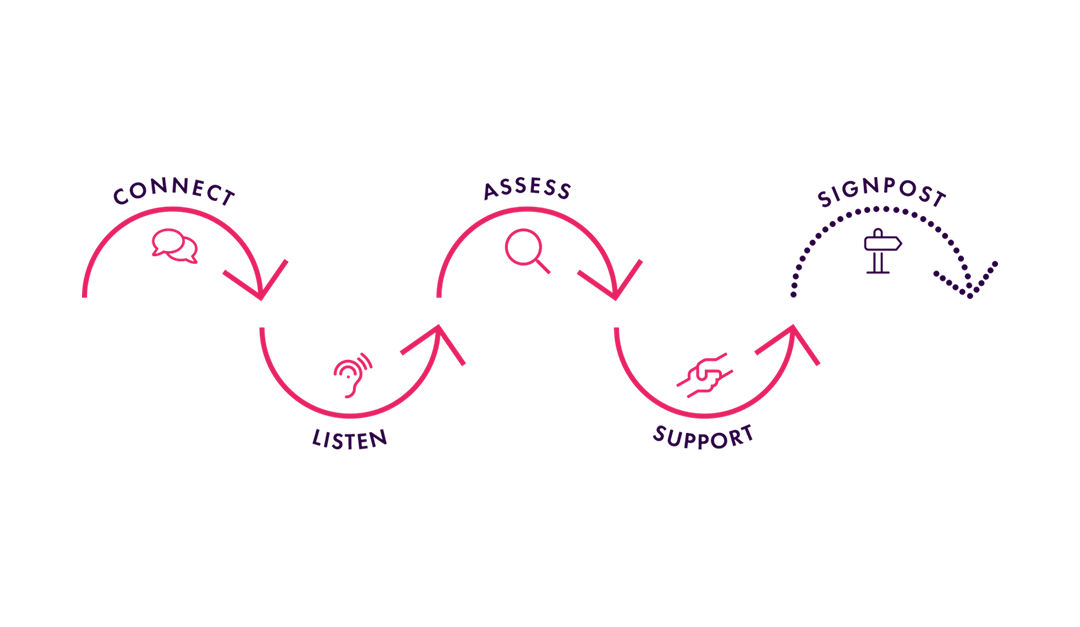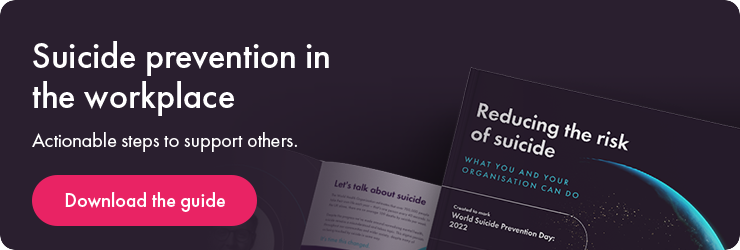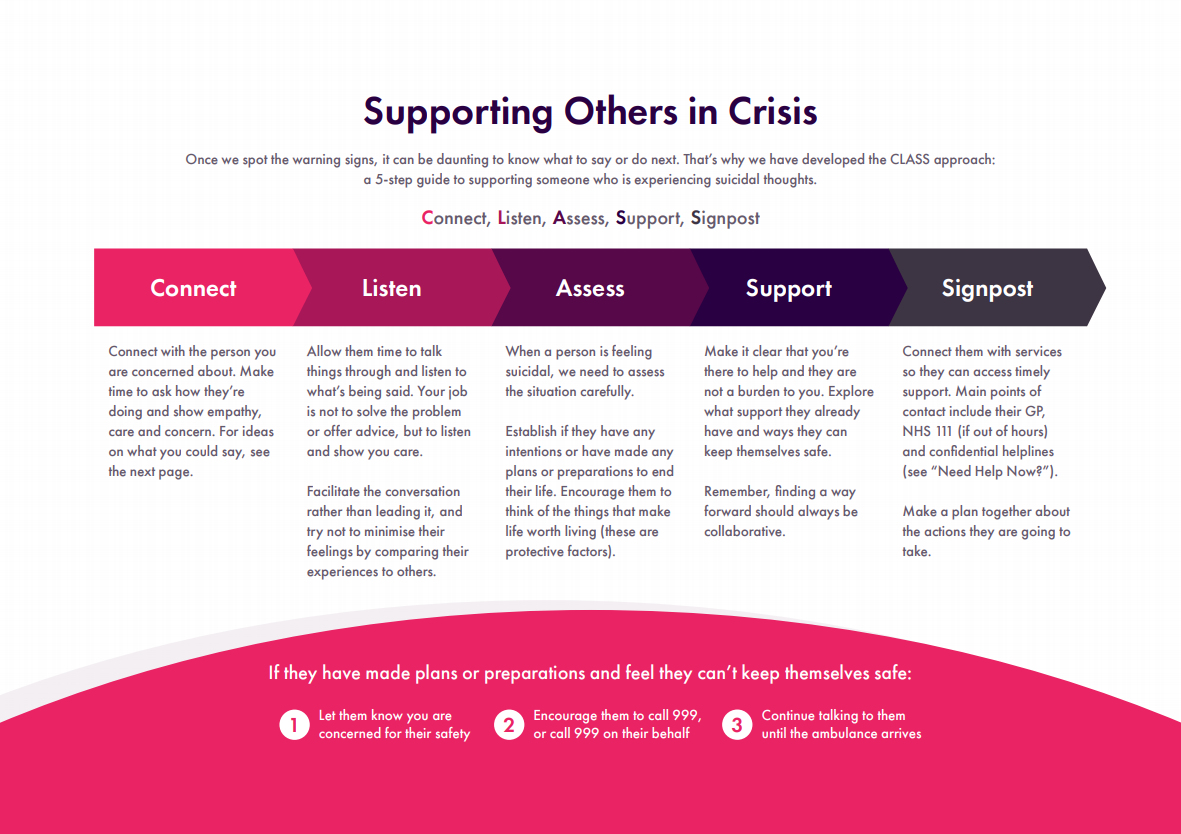If one of your employees or colleagues was in crisis, would you know how to help? Would you know what to say, or even what you’re looking for?
In this guide, you’ll break down the barriers when it comes to crisis. You’ll learn how to support a colleague in crisis by identifying the warning signs and taking the right steps to support them.
Note: If you’re looking to support a colleague with their mental health, but you don’t believe they’ve reached a point of crisis, try this guide on supporting others using the CLASS Approach.
What is crisis?
The term “crisis” can mean different things to different people, but it’s usually when a person feels like they’re at breaking point: like they’ve lost control and need urgent help to manage their situation.
Crisis isn’t usually something that happens overnight. Instead, it’s a culmination of different things, increasing pressures, worries, or overwhelming situations that feel all-consuming. And this creates a snowball effect.
The most serious form of crisis is when people experience suicidal thoughts. There are many things that can lead someone to reach this point, such as intense feelings of isolation or hopelessness, or the belief that they have nothing left to live for.
In this guide, we’re going to help you support your colleagues – whether they’re experiencing suicidal thoughts or are in any form of crisis.
For a closer look at suicide prevention in particular, take a look at our guide created for World Suicide Prevention Day.
Signs of crisis
Crises are complex and this makes it difficult to predict who might experience them, and what kind of warning signs to look out for. That said, there are a few common experiences you might notice in the way a colleague or employee is behaving.
The most obvious sign is them talking about dying, or perhaps expressing how hopeless they are feeling.
For example, they might be saying things like:
- “I can’t see a way out”
- “I’d be better off dead”
They might also talk about feeling like a burden to others, believing that everybody would be better off without them.
These kinds of thoughts may be accompanied by behavioural changes, like excessive alcohol or drug use, a severe shortage of sleep or sudden social withdrawal.
It’s worth knowing that any sudden or unusual changes in behaviour could be a sign that someone is experiencing crisis. So, if you spot the warning signs, what can you do to support that colleague or team member?
How to support a colleague in crisis
Support a colleague that you believe is experiencing crisis using our CLASS Approach. We recommend using this approach to support your colleagues even when they’re not in crisis – however, there are some key differences when it comes to crisis.
Read on for this simple, 5-step process to help you with supporting a colleague or team member in crisis.
1. Connect
This means connecting with the person you’re concerned is going through a crisis.
Make time to ask how they’re doing and show empathy, care and concern. If they say they’re fine, ask twice – “How are you, really?” can make all the difference.
Knowing what to say next and how to say it can be the hardest part, particularly if you’re concerned the person is experiencing suicidal thoughts.
To help with this, we’ve included a list of things you could say to open up the conversation:
- “I know when other people are going through this, they might think about suicide. Have those thoughts crossed your mind?”
- “I’ve noticed you’ve not been yourself recently. Is everything okay?”
- “It sounds like things have been tough. I know that other people who are going through this might think about suicide. Have these thoughts crossed your mind?”
- “I’m glad you’ve told me – it must have been difficult going through it on your own.”
- “These feelings are only temporary – we can get through this moment together.”
- “Now might not be a good time to make a big decision. Let’s take a step back and consider the other options.”
- “What’s helped you to keep safe in the past?”
- “Have you thought about… (e.g. speaking to the Samaritans)? Should we make a plan together?”
It’s crucial you know that asking someone if they feel suicidal will not put the idea into their head.
It might seem counterintuitive, but asking someone directly about suicidal thoughts can be a protective factor.
By asking, you’re giving them permission to talk about how they’re feeling, helping them to feel listened to, validated and like somebody cares for them. Remember, asking about suicide saves lives.
2. Listen
Give them time to talk things through and really listen to what’s being said.
Your job is not to solve the problem or offer advice, but to listen and show you care.
Make sure you facilitate the conversation rather than leading it, and try not to minimise their feelings by comparing their situation to others. Remember that everyone’s feelings are valid.
3. Assess
Assessing the situation is key when you’re concerned about someone in crisis.
If, during the conversation, it becomes clear that they have an intention to hurt themselves, are struggling to identify any protective factors, or have made plans or preparations, it’s important to act quickly. This person’s life could be in danger, and so their safety is your number one priority.
You should also encourage them to think of the things that makes life worth living, also known as protective factors. These could include friends, family, their faith, or even a pet.
Let them know you’re concerned and encourage them to call 999, or call 999 on their behalf. This is the quickest way to get help.
Always take someone seriously if they’re feeling suicidal. It could be that they might not want to die, but the very fact they’re experiencing these thoughts suggests they are really struggling with their current situation, and deserve to access the right support.
If the person is not experiencing suicidal thoughts, but is still in crisis, try asking questions like:
Have you been struggling for a while or is this just a bad day?
Are you seeing a mental health professional?
You’re aim is to find a collaborative way forward, and signpost to the relevant services (which we’ll discuss shortly).
4. Support
Make it clear that you’re there to help and they’re not a burden to you.
Try to normalise the situation and reassure them that they’re not alone in how they’re feeling.
If appropriate, explore what support they already have in place. And if you’re concerned the person is experiencing suicidal thoughts, consider asking what ways they can keep themselves safe.
You could also ask if you can do anything to help, and try to stick to your word as much as possible. Remember, finding a way forward should always be collaborative.
5. Signpost
If you haven’t done so already, connect them with the relevant services so they can access the support they need.
For most people, their main points of contact include:
- GP
- NHS 111 if out of hours
- Confidential helplines like Samaritans, CALM, SHOUT or PAPYRUS
- The organisation’s EAP
Look to make a plan together about the actions they’re going to take.
If you think someone is in immediate danger – follow these steps outlined by Samaritans.
The importance of confidentiality
When someone shares something with us, we should treat it with the strictest confidence.
However, confidentiality has its limits. When a person is at risk of harming themselves or can’t keep themselves safe, the limits of confidentiality are reached.
In this situation, it’s important to do everything we can to keep them safe, including informing a relevant person or calling 999. This ensures they will get access to the right support as quickly as possible.
How to support a colleague in crisis: Takeaways
Just taking on board one of these points on board will better equip you to make a difference – no matter how small. So, remember, a little support goes a long way. Your actions could truly save someone’s life.








